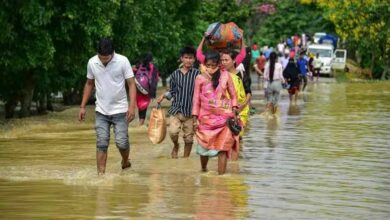Come election season, Karnataka’s indigenous people claim politicians entice them with half-baked promises. Taps now, water later
Children may not look forward to spending five or six hours a day in a small room studying.

However, it’s clear that the seven or so kids, who range in age from three to ten, are thrilled to be seated in the brand-new anganwadi at the Nagarhole Gadde Hadi, a community made up of around sixty Jenu Kuruba tribal households in the Karnataka woods of Nagarhole.
The kids know that the anganwadi is the only pucca structure in that woodland village, and that means it’s a luxury no one before them had.
After years of bribery, the 12×12 room appeared out of nowhere in July of last year, presumably due to the impending election, according to anganwadi worker JK Bhagya.
Even a toilet was provided. We used to work out of a shack before this,” she said, gesturing to the bamboo building next door that had a tarpaulin roof.
The president of Nagarhole Budakattu Jamma Paley Hakkustapana Samiti, the organization that represents the Jenu Kuruba community and organizes frequent protests demanding their basic rights, JK Thimma, stated that the community’s sparse “sops for votes” are the reason why the community bothered to cast their ballots. The community has been fighting the government for decades for even the most basic amenities, like land rights, access to water, and electricity.
As to the official website of Nagarhole Tiger Reserve, 1,703 households from the Jenu Kurubas, Betta Kurubas, Yeravas, and Soliga groups reside in 45 tribal villages, often known as “hadis,” inside the forest.
It is also mentioned that several welfare initiatives have been conceptualized by the federal and state governments for the tribes living within the forest.
But Thimma has a tale to tell that is distinct.
They attempted to drive us out of these woods for years by depriving us of everything. We’ve discovered throughout the years that while there are several assistance programs on paper, they seldom ever reach us. In response to the historical injustice done to us, the Forest Rights Act was created in 2006,” he remarked.
“In 2009, we filed our petitions in accordance with its guidelines. However, we have not yet stopped waiting. We barely get any of the planned benefits, yet those working for the government to carry out such programs get paid on schedule, Thimma said PTI.
Come election season, Karnataka’s indigenous people claim politicians entice them with half-baked promises. Taps now, water later.
In this Karnataka hamlet, Modi’s ‘Jal Jeevan taps’ do not release even a drop of water.
The situation is even worse for the families who choose to migrate in the hopes of living better lives.
In the 1970s, around 74 households were moved from the area around Nagarhole Gadde Hadi to what was once known as Begaru Parai, which is now known as Nanachi Gadde Hadi, in the Ponnampet taluk of the Coorg district.
Ironically, even deep in the forest, the members of the Jenu Kuruba community have access to proper wells and solar set-ups distributed by an NGO that light up a few bulbs in their homes, while the coffee plantations just across the road enjoy continuous electricity and tap water.
However, around election season, things start to happen, according to 43-year-old J S Ramakrishna, who works as a farm laborer in adjacent plantations and sometimes as a driver to make ends meet.
“Not so long ago, the trenches built to keep elephants from migrating to the coffee fields prevented automobiles from entering our community. All we needed was a bridge to get us across to the road. We were eventually awarded at the most recent assembly elections, after years and years of pleading,” said Ramakrishna.
As of right now, under the Jal Jeevan Mission, every home received a tap connection six months prior to the Lok Sabha elections, and the majority of them were approved to get 400 square foot pucca houses under PM JANMAN; some of them have already begun construction.
However, the tap isn’t now producing any water. By the next election, I guess we’ll have them,” Ramakrishna said.
Erumad, a little village on the Tamil Nadu side of the Nilgiris ecosystem, is approximately 70 kilometers from Nagarhole, and things are not all that different there. This region’s Kurumba population has become well-known among the residents and neighboring towns for their customs around the placing of bones.
Tribals in one of the Kurumbas’ communities, known as “kudi” (each “kudi” is made up of around 40 families), laugh at the thought of elections. They understand, nevertheless, that now is the time to make their demands known. Over the years, the Kurumbas in Erumad have made sure they have access to pucca dwellings, water, and power by gradually raising the pitch each election season.
However, 64-year-old Kannan, who comes from a line of shamans who were once the only ones permitted “to heal” people, said they are still unable to find a solution to their main issue. The lands they inhabited in became part of Tamil Nadu once the states gained independence, and according to Kannan, their group was subjugated by Kurumbas in Tamil Nadu.
“We are Mulla Kurmans, and ninety percent of our group still resides in Kerala, which is on the Nilgiris biosphere. The documents we were given classifying us as Kurumbas are worthless in Kerala, where our children are often married into. However, they are not entitled to the privileges that the Mulla Kurmans have there.
Since 1947, we have battled to be acknowledged as Mulla Kurmans in Tamil Nadu as well. Politicians often make promises to us before an election, but we never get their wish,” Kannan told PTI.
Karnataka’s Lok Sabha elections, which will include 28 seats, will take place in two stages on April 26 and May 7.







